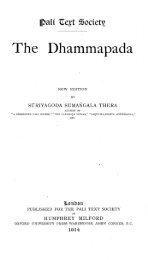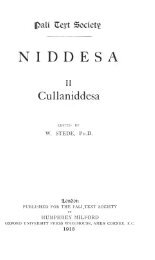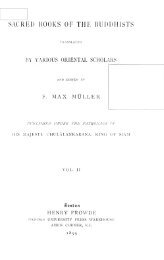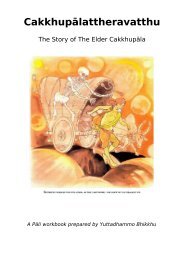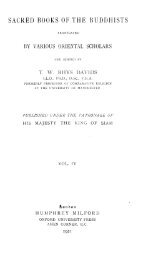Vessantara-Jataka in Pali and English - MyWebSpace
Vessantara-Jataka in Pali and English - MyWebSpace
Vessantara-Jataka in Pali and English - MyWebSpace
You also want an ePaper? Increase the reach of your titles
YUMPU automatically turns print PDFs into web optimized ePapers that Google loves.
Translation 533 <strong>Vessantara</strong>-Jåtaka<br />
[Fausbøll, Jåtaka, vol. VI, p. 533]<br />
"Accepted is your offer<strong>in</strong>g, <strong>and</strong> your oblation, sir.<br />
I seek the son of Sañjaya, once banisht far away<br />
By Sivi's people: if you know where he abides, please say."<br />
The ascetic said:<br />
"You seek the K<strong>in</strong>g of Sivi, sir, not with a good <strong>in</strong>tent:<br />
Meth<strong>in</strong>ks your honour's real desire upon his wife is bent:<br />
Kaṇhāj<strong>in</strong>ā for h<strong>and</strong>maiden, Jāli for serv<strong>in</strong>g-man,<br />
Or you would fetch the mother with her children, if you can,<br />
The pr<strong>in</strong>ce has no enjoyments here, no wealth or food, my man."<br />
On hear<strong>in</strong>g this, Jūjaka said:<br />
"I wish no ill to any man, no boon I come to pray:<br />
But sweet it is to see the good, pleasant with them to stay.<br />
I never saw this monarch, whom his people sent away:<br />
I came to see him: if you know where he abides, please say."<br />
The other believed him. "Good, I will tell you; only stay with me here to-day." So he<br />
enterta<strong>in</strong>ed him with wild fruits <strong>and</strong> roots; <strong>and</strong> next day, stretch<strong>in</strong>g out his h<strong>and</strong>, he<br />
shewed him the road.<br />
"Sir brahm<strong>in</strong>, yonder rocky mount is G<strong>and</strong>hamādan hill<br />
Where lives the K<strong>in</strong>g <strong>Vessantara</strong> with wife <strong>and</strong> children still.<br />
With brahm<strong>in</strong>'s dress, with hook 1 <strong>and</strong> spoon, the ascetic's matted hair,<br />
Sk<strong>in</strong>clad he lies upon the ground <strong>and</strong> tends the fire with care. 2<br />
1 āsadañcamasañjaṭaṁ. The division of the words is doubtful. Scholiast: ākaḍḍhitvā<br />
phalānaṁ gaṇhanattham aṁkusañ ca aggidahanañ ca jaṭañ ca dhārento. I see noth<strong>in</strong>g to<br />
suggest a "hook," unless perhaps āsada, "food-giver" (cf. Skt. åßa, "food"): but the rest of<br />
the couplet describes the religious trapp<strong>in</strong>gs of the ascetic. camasa should be "bowl" or<br />
"spoon," <strong>and</strong> āsada, perhaps "fire," as suggested by schol. B d , aggijuhana-kaṭacchusankhātimasañ<br />
ca. This couplet might have described the ascetic who comes <strong>in</strong> later.<br />
2 These two stanzas are repeated from above (p. 528).



